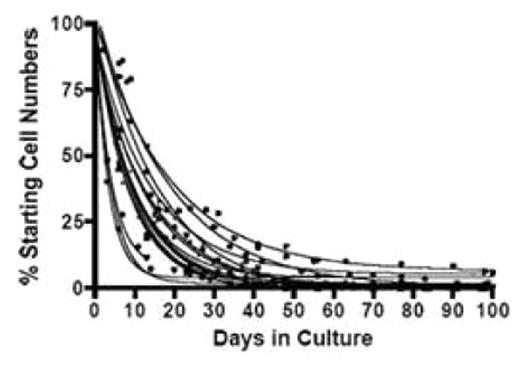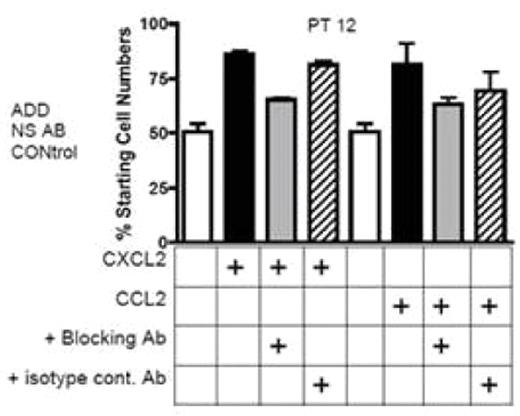Abstract
Aim.
Investigate the in vitro culture conditions that would allow the long-term culture of primary CLL cells and
Identify cytokines responsible for B-CLL survival in vitro
Method. Blood and/or bone marrow was collected, after informed consent, from patients with CLL. Diagnosis of CLL was made according to NCI criteria. Mononuclear cells were cultured at various cell densities in RPMI 1640 medium + 10% heat inactivated FCS. Human cytokine array was performed at baseline day 0 and on supernatant of B-CLL cells which had been cultured in complete media for 7 days using ChemiArray system (Human Cytokine Antibody Array III, Chemicon)
Results. Samples were cultured from 19 CLL patients (9 females, 10 males with median age of 60 years; range 44–90). Patients were predominately untreated, early stage with only 3 patients at Binet stage C or Rai stage 4. The overall trend was that 80% of the total cell population died rapidly leaving a resident population of CD19+CD5+ cells (Fig 1). By increasing the initial seeding cell density to high levels (≥5×107/ml) CLL cells can be cultured out to approximately 90 days without additional stromal cells support from another source. Decreasing the seeding cell densities resulted in reduced cell survival. The surviving cells belonged to the malignant clone and were all CD5+/19+, EBV negative and mostly quiescent, with only 3.5% of the CLL B cells actively dividing. Certain patients’ cells exhibited much better in vitro survival than others but no correlation was found with any clinical parameters including clinical stage (Rai or Binet), lymphocyte doubling time, time to treatment, CD38 positivity, IgVH mutation status or LDH levels. Two novel soluble factors, the chemokines CCL2 (MCP-1) and CXCL2 (GROb), were identified in the culture media which appear to enhance survival of CLL B cells. Addition of exogenous CCL2 and CXCL2 resulted in improved in vitro survival of CLL B cells, while blocking these growth factors with specific antibodies resulted in decreased survival (Fig 2). By immunohistochemistry and intracytoplasmic flow cytometry, the CCL2 chemokine appears to be predominately secreted by the stromal cells.
Conclusion. This study demonstrates the prolonged survival of B-CLL in vitro without additional stromal cell support. Furthermore, novel cytokines CCL2 and CXCL2 appear to prolong the survival of B-CLL cells in vitro. This culture system and these chemokines may allow us to gain insight into factors modulating B-CLL survival and potentially could lead to targeted therapy as well as serve as an appropriate model to test new therapies.
Disclosures: No relevant conflicts of interest to declare.
Author notes
Corresponding author



This feature is available to Subscribers Only
Sign In or Create an Account Close Modal